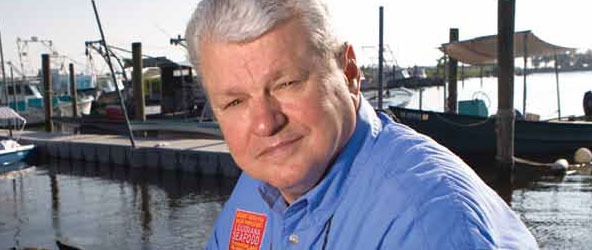As the head of the Louisiana Seafood Promotion & Marketing Board, Harlon Pearce promotes and defends business in the Gulf
The BP oil spill unleashed a spectrum of troubles for Southern Louisiana—economic, environmental and cultural—and the seafood industry lies at the intersection of all three. As a result, the already prominent trade group the Louisiana Seafood Promotion & Marketing Board has risen even higher in importance, and Chairman Harlon Pearce continues to be its public face as he works feverishly behind the scenes to defend the interests of all the individuals and businesses reliant on the state’s seafood industry.
Media outlets contact Pearce for interviews just about every day, but he’s not intimidated by cameras pointing in his face. “I’ve done the media for a long time,” he says. “I’m comfortable with it. At least the media is coming to us. We can send them to the right places and keep things as positive as we can.”
Although the seafood board is a trade group, it’s also a quasi-governmental body with authority written into state statutes. In addition, Pearce is a voting member of the Gulf of Mexico Fishery Management Council, which regulates fishing seasons, manages stock and sets laws regarding the harvesting of Gulf seafood. Both of these positions are volunteer. Pearce’s main job is owner of Harlon’s LA Fish, a wholesale seafood distribution company based near the airport that does about $15 million in sales a year.
“I believe a rising tide floats all boats,” says Pearce. “When I am able to defend the industry and make it stronger, my company benefits, too.”
A primary message that Pearce and the seafood board have been trying to get out is that the product on the market is safe to eat. Actually, it’s safer than ever before because it has been receiving so much scrutiny. The National Oceanic and Atmospheric Administration, the Environmental Protection Agency, the Louisiana Department of Wildlife and Fisheries, the Food and Drug Administration and several other regulatory bodies have a hand in testing seafood safety. And not a single tested item has been rejected.
So according to Pearce, if people want to help out fishermen and everyone else in the industry, the main thing they can do is buy and eat more seafood. Restaurants that have served quality seafood before the spill will continue to serve quality seafood. The same goes for grocery stores and fish markets. These businesses know better than to damage their reputations by serving unsafe product. If customers trusted them before, they should trust them now.
“Our brand has been challenged. The name Louisiana has been hurt,” he says. “I don’t think we can turn that perception around easily.”
Although production is down sharply in the Gulf, Pearce does not believe supply is an issue. In May 2009, 4,500 fishermen caught 32 million pounds of seafood, compared with 12 million pounds caught by 2,800 fishermen in May 2010. Nevertheless, 12 million pounds is a lot of fish. Fish, crab and shrimp fisheries still offer their bounties, and while prices of some items jumped right after the spill began, they’ve stabilized. Oysters have been affected the most, because they can’t move out of harm’s way, and freshwater diversions to push away oil have diminished their numbers. It’s the only product that can be hard to acquire, but aside from precautionary closures of oyster beds, Pearce says the impact has been minimal.
“We’ll come out of this standing up, as we always do,” he says. “We’re resilient. This oil spill is a tough one, but it’s just another battle we’ve got to fight.”
And Pearce has seen a lot of battles over his long career, which began when he was drawn into the seafood business unexpectedly. After growing up in Jefferson and graduating from Southeastern, he enrolled in law school at Loyola University. To support himself, he worked at a his uncle’s seafood market, called Picone’s, located on South Broad near Washington. Although Pearce believes he would have made a good lawyer, he discovered that he far preferred the seafood business; he enjoyed the chance to get into the outdoors and liked the rugged, no-nonsense people he’d meet. He later worked for another seafood distributor before starting his own company 20 years ago. Over that time, he’s seen the fortunes of the seafood business rise and ebb like the tides. The last great challenge (from which the industry is still recovering) was the decimation caused by Hurricanes Katrina and Rita.
These days, Pearce has been coordinating with BP to see what can be done to get fishermen back to work. BP’s Vessel of Opportunities program, designed to put fishing boats on cleanup duty, has good intentions, says Pearce, but too many fishermen are sitting idle and are uncertain of their options. To promote fishing in unaffected waters and put people back on their boats, the seafood board is supporting a “Back to the Dock” program that calls on BP to underwrite a 30 percent bonus for every pound of product caught. Proposals such as this one, however, are basically works in progress.
Once the leak is taken care of we need to “address the industry’s concerns,” says Pearce, “to address branding, to address the marshland. Once the oil stops flowing, it’s not the end. That’s the beginning.”

